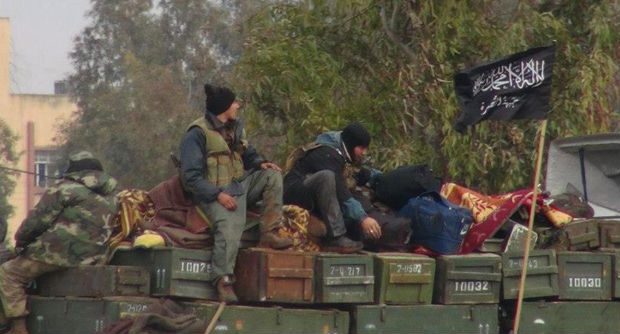Syria/Iraq: Who is fighting ISIS?

In this Friday, Jan. 11, 2013 file photo, citizen journalism image provided by an anti-Bashar Assad activist group Edlib News Network (ENN), which has been authenticated based on its contents and other AP reporting, rebels from al-Qaida-affiliated Jabhat al-Nusra, also known as the Nusra Front, sit on a truck full of ammunition at Taftanaz air base, that was captured by the rebels in Idlib province, northern Syria. AP FILE PHOTO
BEIRUT, Lebanon—A breakdown of the main forces fighting Islamic State of Iraq and the Levant (ISIS) jihadists in Iraq and Syria, after operations by warplanes from France’s Charles de Gaulle aircraft carrier were launched on Monday:
READ: France strikes ISIS from newly-deployed carrier — ministry
– Syrian and Iraqi armies—SYRIA: The Syrian army numbered 178,000 troops in 2015, according to the International Institute for Strategic Studies (IISS). Syria’s army has been roughly halved from its pre-war strength by deaths, defections and increased draft dodging. In its fight against rebels and jihadists, it relies on militias, which boast 150,000 to 200,000 members.
– IRAQ: The army counts 177,600 men, according to the IISS. After the US invasion in 2003, the Americans dissolved the army, which was then 450,000 strong, and rebuilt a new force which collapsed in June 2014 faced with the IS.
Washington and its allies then sought to train the Iraqi army and the government to restructure it. Since September. it has had at its disposal American F-16 fighter jets. It depends on Shiite militias, notably the Popular Mobilisation units (Hashed al-Shaabi) and Sunni tribes.
– Kurdish forces and rebel militias—Kurds have defended their own territory from the IS, backed by raids by the US-led coalition with Syria’s Kurdish People’s Protection Units (YPG) in the north and northeastern Syria, and peshmerga in northern Iraq.
– In Syria, after the failure of a plan to train rebels, Washington has offered support since October 12 to a coalition of Kurdish militia and rebel groups: the Syrian Democratic Forces (SDF), an alliance between the powerful YPG and other Syrian rebel groups.
– Elsewhere in Syria, the armed opposition is fractured between a variety of moderate and Islamist rebel groups, including the powerful Ahrar al-Sham faction in north and northwestern Syria, the Army of Islam near Damascus, and the Southern Front in Daraa province.
Some of those forces have at times allied with Al-Qaeda affiliate Al-Nusra Front, which is in turn a rival of IS.
– Foreign forces—A US-led international coalition has been conducting air strikes in Iraq since September 2014 at Baghdad’s request, and in Syria, where it has so far refused to collaborate with the Damascus authorities.
The coalition comprises around 60 countries, including Britain, France, Syria’s Arab neighbours and Turkey, as well as since late September Tunisia, Malaysia and Nigeria.
It has ruled out any boots on the ground but has sent in soldiers to train Iraqi troops.
Less than a dozen of the countries actually carry out air strikes, which have totalled 8,200 over the past year, and of which the US has carried out four fifths.
Five countries—the US, France, Canada, Australia and Jordan—are taking part in air strikes in both Syria and Iraq.
Others are taking part in strikes in Syria but not Iraq: Saudi Arabia, Bahrain, United Arab Emirates and Turkey, or in Iraq but not Syria: Denmark, the Netherlands and Britain.
Washington, whose aircraft carrier USS Harry S. Truman is expected in the Mediterranean, has sent 3,500 soldiers to Iraq and will deploy in Syria some 50 soldiers from its special forces.
They do not take part in ground combat, except for one-off operations.
FRANCE: is stepping up its air strikes in Syria after the November 13 terrorist attacks in Paris claimed by the IS. It has mobilised 3,500 soldiers, and deployed in the eastern Mediterranean its aircraft carrier Charles de Gaulle, more than doubling its strike capacity.
TURKEY: launched its first air strikes with the coalition on August 28, and authorized the US to use its strategic base at Incirlik.
RUSSIA: An ally of the Damascus regime, Moscow launched air strikes on September 30 in Syria, after boosting its military presence over the summer and is building an air base near the northwestern coastal town of Latakia.
Its fleet in the Caspian Sea is also firing cruise missiles. Moscow, which is calling for a “large anti-terrorist coalition” has according to the Russian press sent up to 2,000 soldiers.
Accused by the Americans and their allies of targeting the opposition to Damascus rather than the ISIS, Moscow has stepped up attacks on the jihadists since the Paris attacks and the downing of a Russian plane over Egypt’s Sinai, though it continues to strike other groups too. Russia, Iran, Syria and Iraq have been coordinating intelligence since September.
IRAN: The Shiite power backs the regimes of Damascus and Baghdad and has committed its elite troops, the Revolutionary Guards, in Syria with some 7,000 soldiers, and also in Iraq.
LEBANON: The powerful Shiite militia Hezbollah has committed between 5,000 and 8,000 fighters to Syria where it is fighting alongside the army.
RELATED STORIES
White House asks allies to step up in Islamic State campaign
Malaysian PM calls IS ‘evil’ group














